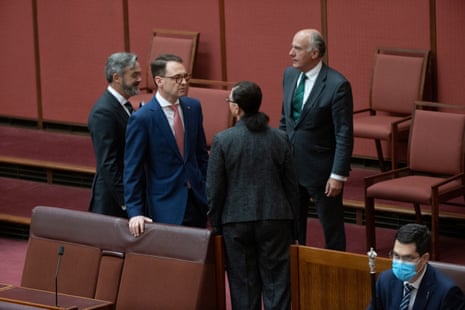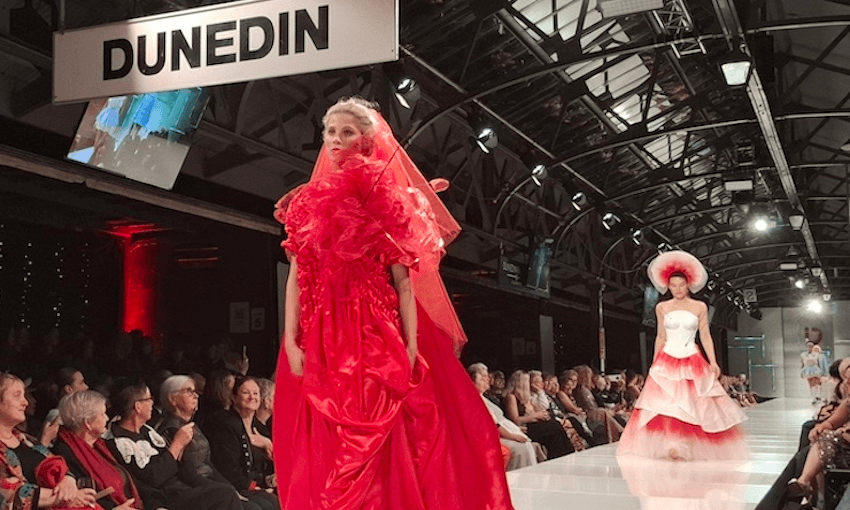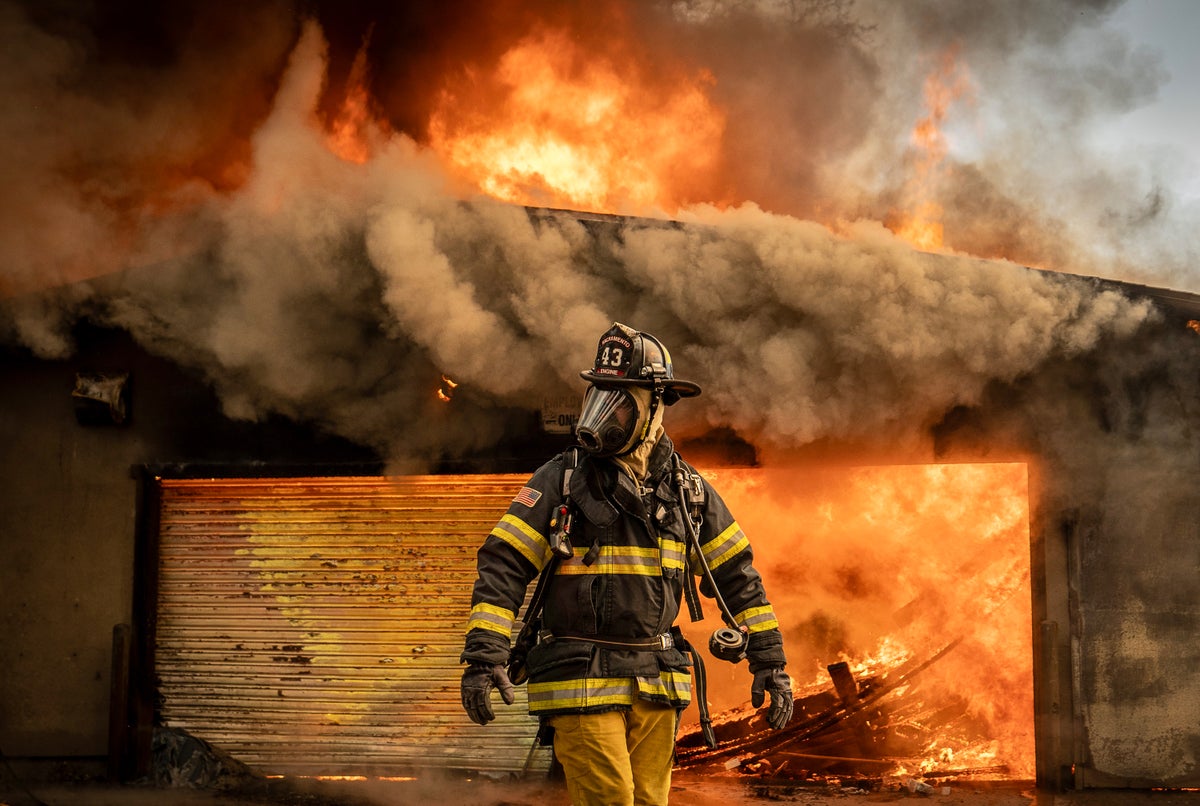Shorten: mortgage holders are ‘the meat in the sandwich’ between interest rate rises and inflation
Bill Shorten has also been asked about interest rate rises and told the ABC:
You understand the RBA is independent. The government … doesn’t make the decisions on interest rates. There’s no doubt, though, that millions of people are feeling pain here by these decisions.
The reason why the RBA says it increases the rates is to put the inflation genie back in the bottle. The federal Labor government’s tackling inflation in a range of ways. We want to get wages moving, cost of living measures to support people with energy prices, child care.
We want to take some of the speed limits off the economy, bring back more … skilled labour into the economy itself. Unblock some of the supply chain issues with energy and of course we will at the next budget demonstrate … increased fiscal responsibility, but with the Reserve Bank increasing the rates … the issue for mortgage holders is: are they the meat in the sandwich here?
And I think they are. The reality is that hopefully inflation is coming down anyway, so for some of the commentators out there who are pushing for more interest rate rises, [these are] real people who are getting affected very painfully by increased mortgages.
But that would also include the RBA board, which has warned there will be more interest rate rises coming. The RBA doesn’t just want inflation to come down, it wants it to come down to its target range for core inflation – which is 2 to 3%. And we are a long way off from that at the moment.
Key events
Filters BETA
New vaccine dose available for Australians who have not had a vaccine or Covid in the last six months
The health minister, Mark Butler, and the chief medical officer, Dr Paul Kelly, are giving updates on the news this morning that Australians who have not had Covid or a recent Covid vaccination in the last six months are now eligible for another dose of vaccination.
Butler:
Now if you haven’t had a Covid vaccine dose in the last six months, adults can get the next dose of Covid vaccine to top-up your protection from 20 February this year.
Atagi has been particularly clear about its [target] for those Australians most at risk of severe disease, which they identify as Australian 65 years and older, and Australians under that age who have various health conditions or are immunocompromised that makes them vulnerable to severe disease.
For those Australians the very strong recommendation from Atagi is it is now time for your next dose of Covid vaccine, provided you have not had a dose in the past six months or been infected with Covid in the past six months.
The vaccine advisory group have said that otherwise healthy children or teenagers do not need an additional dose. And so the additional vaccine dose [is] not provided to children and teenagers under the age of 18, except where they have health conditions that have been identified as placing them at risk of severe illness.
Sally Sitou responds to Dutton on online trolling
Labor MP Sally Sitou has responded to Peter Dutton’s speech through her social media:
Today marks one year since the ‘Set the Standard’ report was delivered to drive positive cultural change in parliament. It was an opportunity for leaders from all political parties to step up and show bipartisan support for everyone who works in this place, particularly women.
Instead the leader of the opposition, Peter Dutton, decided to use his speech to pit the experiences of progressive female parliamentarians against those in the centre-right. Suggesting that women in the Coalition experience more online trolling.
I can assure him that I too get trolled online, in a way that is both gendered and race based. But that’s not the point of today. The point of the Set the Standard report is to ask us all to do better.
There is a role for all men and women – across all parties and independents – to help make this place a safe and inclusive workplace. In order to lift the standard of debate in this country and make it more respectful – we need all our leaders to work together.
Dutton champions ‘diversity of opinion’ and calls for online reform of social media ‘dominated by the extreme and insidious left’
As these Set the Standard speeches are given in the chamber, the mood is getting more and more unsettled. Not the tone I think many were hoping for.
There is quite a bit of defensiveness and also score settling happening. Like this from Peter Dutton:
Today we have 10 women in the shadow cabinet, the same number as the government has for its cabinet, and 17 women altogether in [the] outer and assistant shadow ministry.
Women are there because of their experience, their skills, and their work ethic and as the leader of the Liberal Party I want to see more women and more people from diverse backgrounds, especially those with a migrant or Indigenous heritage, join our party and our parliament.
Unquestionably a factor which can discourage women from pursuing political office is the reprehensible treatment that several female politicians have received online in recent times, and obviously such behaviour is not limited to Liberal women, but women of centre-right views are subjected to some of the most disgusting vitriol online and [on] social media dominated by the extreme and insidious left.
When women have a centre-right persuasion [they are] harassed by people. Like [the] former MP Nicole Flint and senator Jacinta Price, they’ve been subjected to [this] even [to] this very day. No wonder they’re hesitant to pursue a political career.
If we want to have the best Australians to serve in this place, regardless of their politics, online reform is a societal issue the parliament needs to address as a matter of urgency.
It’s well and good to provide greater diversity in our parliament and so we should, but if women, particularly [those of] a centre-right political persuasion are deterred from pursuing a political career, then we will damage our democracy.
And the sanctimony is obvious from many in this debate, because the most important diversity of all, the diversity of opinion will otherwise simply not exist.
Dutton lists Liberal firsts
To be entirely fair, because this seems to be bothering some people in the opposition, Peter Dutton says Trent Zimmerman was the first openly gay member of parliament. Now, when I hear parliament, I think both chambers. The opposition leader meant it in the technical sense, of Member of Parliament as in MP. I heard member of parliament, as in both chambers – of which the senate is one, and has had many openly gay members before 2016 when Zimmerman was elected.
So this post has been altered from the original, because we all have better things to be doing.
Speaking on the Set the Standard motion, Dutton was mentioning the various firsts the Liberal party can claim.
-
Enid Lyons – the first female member of parliament (Lyons joined the Liberal party upon its creation) and was the first woman in cabinet)
-
Neville Bonner – the first Indigenous parliamentarian.
-
Ken Wyatt – the first Indigenous cabinet minister.
And then Trent Zimmerman – “the first openly gay member of parliament”.*
Bob Brown, the former leader of the Greens, was elected in 1996. And was openly gay. Both while sitting in the federal parliament and the Tasmanian parliament before that.
Labor’s Penny Wong came out soon after winning her Senate seat in 2002.
*Now it has been put that Dutton said member of parliament in the ‘factual’ sense, meaning the house of representatives, and Zimmerman, who won a byelection in 2016, was the first openly gay person to sit in the house of reps. Perhaps it is I who needs to brush up on history, as I have never heard of the lower house being called parliament, given that parliament is two chambers – with the senate claiming openly gay members, including the Liberal’s Dean Smith, as well as Brown and Wong. So I am adding this addendum here, for the technical point being made – however most people would consider parliament to be two chambers.
Paterson: Extent of Chinese-made camera usage in government is not a partisan issue
So what answers have James Paterson’s questions yielded so far?
Well, a number of government departments have identified [Chinese-made cameras]. In the first instance, the Department of Home Affairs, I approached and asked them whether they had it on their sites and whether they had visibility of these cameras on any other sites throughout the government.
They identified a couple of cameras at two sites in buildings they occupied, which is obviously concerning because the Department of Home Affairs is our principal policy agency for national security, and there is no business having Chinese government-linked surveillance companies having their cameras installed in those sites.
But equally concerning for me was that Home Affairs did not know and was not able to tell me whether or not there were any other of these cameras in the Australian public service. And so that’s why I launched this audit, which I hope we’ll have the results of soon.
Q: So why … do they get through the tender process and the like in the first place?
Paterson:
That’s an excellent question and I suspect the answer to that is that it is because they offer value for money, in a very superficial sense. It is often the case that they undercut their commercial rivals.
They are closely linked to the Chinese government. And like many other leading Chinese technology firms, they have assistance from the Chinese government, including concessional loans and subsidies, and that does allow them sometimes to outcompete their Western competitors and make them look like a more attractive offering.
But of course, the discount that you get upfront is not worth the long-term national security risks you expose yourself to.
Q: Okay. So, an issue for both sides of parliament. Unless these cameras were installed in the last nine months, they could very well have been approved under the Morrison and Turnbull governments.
Paterson:
I’m not seeking to make this a partisan political issue at all. I’m not attacking the Labor party over this. It’s a problem which I’ve now identified which has to be fixed and they’re the government, so I hope that they will fix it.

War Memorial removing Chinese-made surveillance cameras amid spying fears
The Canberra Times broke the story the Australian War Memorial is removing surveillance cameras made in China amid fears they could be used for spying.
The Liberal senator James Paterson, who is quite hawkish on these matters, wants an audit of all the cameras in government agencies and departments to remove any Chinese-made devices.
He told ABC News Breakfast:
I’ve asked every government, department and agency to come back to me through questions on notice, through the Senate, to answer that question. And I hope to have the results of that very soon.
The War Memorial is to be commended in a sense that they recognise that they have these devices and that they should be removed. In their response to me, they said the devices that they have at their site here in Canberra will be removed and that is appropriate recognition of the national security risks that they pose.
Report finds 81% of Australians think property is unaffordable
The Property Council has launched its report A Stark Reality and surprise, surprise – 81% of Australians think that property in this country is unaffordable.
Wonder what gave them that idea?
You can find the report here, but it makes for some depressing reading.
Andrew Bragg outlines Liberal case for supporting the Indigenous voice
The Liberal senator Andrew Bragg has started how he means to go on regarding the voice, releasing this statement this morning:
There is a strong case for constitutionally enshrining an Indigenous voice to parliament, but we must ensure that any change is safe for our system of government.
Legitimate concerns have been raised, particularly the risk of a transfer of power from parliament and the executive to the high court.
To address these concerns, a new paper sets out the remaining issues which I hope will encourage a proper inquiry into the proposed voice amendment.
A copy of the paper can be found here.
Indigenous people are the only group of people in Australia who face a slew of “race”-based laws. It is illiberal that Parliament makes these laws without engaging Indigenous people.
The voice will empower Indigenous communities to work collaboratively with government to make their own decisions. Giving these communities a voice should drive community-level decision making, ensuring that people are not locked into poor, paternalistic policies.
A parliamentary inquiry remains the best mechanism for resolving these issues, it can assess legal concerns and ensure that the voice is safe for our system of government. The inquiry should commence before the constitutional amendment bill is presented.
This is the best way to maximise crucial bipartisanship.


Josh Butler
Albanese ‘hopeful’ inflation has peaked, rejects calls to sack RBA governor
The prime minister, Anthony Albanese, said he was hopeful inflation had peaked in Australia, but accepted financial pressures were having an impact on people.
In a quick doorstop interview after the UN Women Australia International Women’s Day breakfast in Parliament House this morning, the PM noted that his government had extended paid parental leave and reduced costs of early education in a bid to boost women’s economic participation, as well as extending paid domestic violence leave.

In an earlier speech, he also noted the pay rise the government had committed to deliver to aged care workers and nurses. The Health Services Union will hold a Parliament House event later today, complaining that the government is planning to phase in that pay rise over two years instead of all at once.
The HSU president, Gerard Hayes, said the government’s planned pay rise this year “just won’t cut it. That pay rise will be swallowed whole by rents, energy and other price hikes.”
This sector is crumbling before our eyes. An aged care worker can walk across the road and earn more at KFC, Bunnings or in disability care in a flash.
If the government can keep its commitment to stage three tax cuts, which deliver billions to people who don’t need them, surely it can look after a workforce of insecurely employed, underpaid women who won a decent pay rise, fair and square.
Albanese shared his alarm that Australia ranked 43rd on a global index for economic equality: “there’s clearly more to be done”.
Asked about yesterday’s interest rate rise, Albanese hoped the RBA was correct in predicting inflation had peaked, and said he was hopeful that Australia would see a downward trend in that indicator.
In some of the advanced economies [inflation] has reached double digits, so it hasn’t reached that here but it clearly is having an impact.
The PM rejected calls from the Greens to sack the RBA governor, Phil Lowe, or to reverse the interest rate rise, claiming the minor party “sometimes don’t understand the way the economy works”.
We have an independent Reserve Bank, that is a very important principle, one that we maintain.
Asked about the drama yesterday in parliament where the government had to ram through a determination to declare Nauru a regional processing country, after such a notice lapsed in October without action being taken, Albanese claimed there was “no impact … it was dealt with yesterday clearly by the parliament”.
Andrews predicts defaults on some mortgages as interest rates spike
Karen Andrews did make the point, though, that there will soon be loan defaults for those people on the mortgage bubble.
I think it’s a real possibility because many people are very heavily mortgaged, and they were heavily mortgaged with interest rates were very low, but they were paying now about 1.8%. So now that they’re probably paying upwards of 5.8% or they’re about to be in the very near future, when their loan moves from fixed to variable, they’re going to have to look at what they’re going to do, whether or not they’re going to sell to recover some of the costs that they’ve sent to pay their mortgage.
Now, that would be very concerning. We have seen markets around the country starting to drop for real estate. So prices are starting to come down.
That means that people can no longer afford or [be] prepared to inject as much money as they had previously into real estate, whether that’s for a home to live in or whether it’s for investment purposes.
Investors eye RBA cash rate nudging 4%

Peter Hannam
There’s ongoing fallout today from yesterday’s RBA interest rate rise, but particularly over the central bank’s confidence that further increases are to come.
Investors, who were predicting a peak cash rate of about 3.6% prior to the rates decision and commentary, are now pencilling in a topping-out just shy of 4%.
After the RBA signalled further rate rises are to come, investors have lifted their expectations of how high the central bank will go. They’re now betting there’s a two-in-three chance of another 25bp rise in March on the way to a peak rate approaching 4%. pic.twitter.com/wY1AAm3cf1
— @phannam@mastodon.green (@p_hannam) February 7, 2023
Another 25 basis-point increase to 3.6% in March – which investors assess as a 65% chance – would make it 10 rate hikes in a row, should it come to pass.
The Aussie dollar, meanwhile, is hovering about 69.5 US cents, about a third of a US cent higher than prior to the rate rise.
Among the things to watch is how much of a lag there is between commercial banks announcing a lifting of their lending rates (usually fairly immediately) and those for deposits (don’t hold your breath).
Exhibit A: NAB last night said it would pass on the fall quarter-point to borrowers from 17 February, taking the lowest variable rate to 5.24%. But as RateCity notes, “at this stage, NAB is not passing on a single rate increase to its savings customers”.
The treasurer, Jim Chalmers, last month asked the competition watchdog (the Australian Competition and Consumer Commision) to monitor banks’ deposit offerings. Looks like there’s some watching to be done.
Andrews: Labor is continuing on ‘like the modern-day Boudicca’
Karen Andrews was in such a good mood, she got a little creative in her answers.
Andrews:
The Reserve Bank is saying that there’s 800,000 people that will move from a fixed loan into a variable loan. That is going to have an enormous impact on people’s ability to spend some money. Now, whilst we need to have restraint to bring the budget back under control, anecdotally, many of the shop owners pre-Christmas were saying that people were still splurging before Christmas, because they knew post-Christmas there would not be any money available for them to really cover the basic necessities that they needed. But the government seems to be particularly silent on the fact that people are hurting.
There’s no acknowledgement that people are suffering at the moment that there is pain and it is only going to get worse. It’s like when the minister for home affairs went into parliament … yesterday and spoke about the legislation that was needed to designate Nauru as a regional processing centre.
There was no mea culpa for her mistake, and it was clearly her mistake. There was absolutely no recognition of anything that had gone wrong.
This is the government that doesn’t know how to look after the people who were hurting here in Australia, and they are just continuing on like the modern-day Boudicca.
Now, my understanding of the warrior queen Boudicca was that she led a rebellion against Rome after her husband was killed, she was publicly beaten and her daughters raped. She then led an army and sacked two Roman cities, bringing much shame to the Roman empire, because they had been beaten by a woman. Her army was eventually defeated, but we still speak of the warrior queen for a reason.
So not sure it is the best analogy here, but points for trying.

Opposition says Labor’s need to rush Nauru legislation “unforgiveable”
The shadow home affairs minister Karen Andrews has been out and about today after yesterday’s parliament shenanigans, when the government gagged debate to quickly pass a motion to re-designate Nauru as a regional processing centre. The legislation lapsed in October, noone seemed to notice, and then suddenly it was a huge deal that the government placed an urgent motion on.
The opposition supported it, the Greens and the crossbench were outraged, and all in all, it was definitely NOT “politics done differently”. Andrews though, seemed in a good mood this morning:
It is unforgivable that the Labor government could do absolutely nothing in a four-month period of time to ensure that there was a regional processing centre designated.
Now, it is important, and that was demonstrated by the fact that Labor suspended standing orders yesterday to try and rush through this legislation … if they’d handled this in a timely manner, firstly, it would not have led to the issues that we had to deal with yesterday. Secondly, it would not have left the hole in our border protection, but thirdly, it would not have enlivened the debate that ensued yesterday.
Now, many were quite concerned at the actions – or the inactions, quite frankly – of the Labor government.
Shorten: mortgage holders are ‘the meat in the sandwich’ between interest rate rises and inflation
Bill Shorten has also been asked about interest rate rises and told the ABC:
You understand the RBA is independent. The government … doesn’t make the decisions on interest rates. There’s no doubt, though, that millions of people are feeling pain here by these decisions.
The reason why the RBA says it increases the rates is to put the inflation genie back in the bottle. The federal Labor government’s tackling inflation in a range of ways. We want to get wages moving, cost of living measures to support people with energy prices, child care.
We want to take some of the speed limits off the economy, bring back more … skilled labour into the economy itself. Unblock some of the supply chain issues with energy and of course we will at the next budget demonstrate … increased fiscal responsibility, but with the Reserve Bank increasing the rates … the issue for mortgage holders is: are they the meat in the sandwich here?
And I think they are. The reality is that hopefully inflation is coming down anyway, so for some of the commentators out there who are pushing for more interest rate rises, [these are] real people who are getting affected very painfully by increased mortgages.
But that would also include the RBA board, which has warned there will be more interest rate rises coming. The RBA doesn’t just want inflation to come down, it wants it to come down to its target range for core inflation – which is 2 to 3%. And we are a long way off from that at the moment.
Liberals say government ‘needs an economic plan’
Now quite a few opposition MPs have been asked, repeatedly, what they would do differently if they were in government in these economic circumstances.
The answer? The government needs an economic plan.
I am not sure if it is in the talking points or not, but it is something we are hearing A LOT in response to the question “what would you do”. Case in point:
Sky News host: The Greens made a bold claim yesterday to override the RBA decision using the RBA Act. Would you support that at all?
Sussan Ley:
Not at all, and we often see some extreme claims from the Greens and I think we’ll just leave that one exactly where it is.
Host: Okay, you mentioned that the government should be doing more because ultimately Australian households are the ones who get punished for all of this. So what is your answer to this? How do you fix it? How do you make life easier?
Ley:
Well, the most important thing is for the government is to have an economic plan.
Opposition attacks over cost-of-living continue
Over on Sky News, the deputy Liberal leader, Sussan Ley, continues the attack the opposition ramped up this week: “you will always pay more under Labor”.
The opposition have wholeheartedly embraced this line and are really hoping people will link the rising cost of living with the Labor government and reinforce the historical misnomer that Labor are worse economic managers.
Again, an old playbook, but an effective one. It really will depend on what you guys think about whether or not it will work.
Asked about the interest rate rises, Ley says:
As you say, this is really sobering news for Australians, particularly those with mortgages. It just goes to show you will always pay more under Labor. The ninth consecutive rate rise, with Philip Lowe warning that there will be more … families are now having to make tough decisions, even families with second jobs. You know, what do we not spend money on? Do we not take a holiday? Do we not undertake that expenditure for our family for our future? It’s all going on the mortgage.
With 800,000 Australians coming off fixed rates, there could be a jump of several percentage rate in their mortgage payments, which adds up to $10,000, $12,000, or $15,000 a year are some of the figures I’m hearing. So, as I said, it’s really sobering news.
For the record, there have been many people with second, or even third jobs for quite some time. During the pandemic, there was a record number of people with second jobs. That was when the Coalition was in power.

Josh Taylor
Telstra gives undertaking to comply with ‘priority assistance’ obligations after regulator finds numerous breaches
Telstra has given an undertaking to the Australian Communications and Media Authority (Acma) that it will comply with its “priority assistance” obligations after the watchdog found some customers with significant medical issues were not given urgent help when their phone lines were not operational.
Telstra is required to provide priority assistance to customers who have a life-threatening medical condition, and once identified, must have systems in place to provide those customers with additional levels of service.
Acma found that the company had failed to send application forms to 260 customers who enquired about priority assistance and had failed to initiate emergency medical request procedures five times for two customers, including making sure to fix phones quickly.
Acma’s chair, Nerida O’Loughlin, said Telstra needed to have adequate systems in place. The authority can take Telstra to court if the company fails to meet its undertaking.



















Discussion about this post